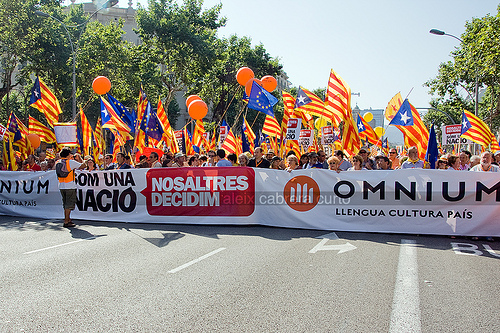Bill Bonnar on the emergence of a powerful independence movement in Catalonia
In January 2010 a Conference was held in Barcelona under the title; The Struggle for Socialism in Nations without a State. Sponsored in part by the Left Republican Party of Catalonia it included representatives from left parties from the Basque Country, Galicia and elsewhere. I spoke at the Conference on behalf of the Scottish Socialist Party; one of several meetings and events I attended in the course of a week of activities. Not surprisingly the conference was dominated by representatives from Catalonia. Perhaps the most interesting thing to emerge was the commonality of discussion. In particular, that independence should not be seen as an end in itself but as a means to an end. What was important was not just independence but what kind of independence. The Left, while being part of the general campaign for independence, had to forge a distinctive Left vision of what that independence would look like. Not surprisingly several key themes emerged. That the new independent state should be a republic, that it should have an economic system based on sustainable growth with a strong public sector, that environmental concerns should be a high priority, that the government should pursue policies aimed at the eradication of poverty and inequality and that it should pursue what was referred as a progressive foreign policy. While it was recognised that taken together this did not add up to socialism it was seen as a good starting point.
That was then. Nearly three years later it is clear that real advances have been made particularly in the Basque Country andCatalonia. In September nearly 2 million people brought Barcelona to a standstill in a demonstration in support of independence. This followed various opinion polls which show between 40% and 50% support for independence and a general trend for this to be increasing. What makes these polls interesting is that an increasing number of non-Catalans seem to be supporting independence. More than half the population of Catalonia is made up of Spaniards and nationals from other EEC countries. This was always seen as the guarantee that in any future referendum pro - independence voters would always be in a minority. This appears to be changing. The economic crisis which is engulfing Spain is fuelling movements for change and in Catalonia it is fuelling the desire for independence.
Like independence movements elsewhere there are different streams to this movement. A large part of this is cultural in nature around the language and culture of Catalonia. It would be like the independence struggle in Scotland being based in and around the Gaelic movement. The movement is very broad based with even some reactionary element directed against non-Catalans. The alternative is provided by the Left. Typically there are a number of Left organisations of which the most prominent is Esqerra Republicana de Catalunya (Republican Left of Catalonia). The party, under a different name, rose to prominence during the Spanish Civil war as part of the coalition which formed the Republican Government. During the Franco dictatorship it suffered violent repression before re-emerging and reforming in its current format.
It currently has ten seats in the Catalan Parliament and expects to make gains in elections later this year.
The party’s political positions were laid down at its 1993 Conference and contained in its Statement of Ideology.
- Esquerra – commitment to a Left agenda on social and economic issues.
- Republican – commitment to the establishment of a modern republic forCataloniaand the rest ofSpain.
- Catalunya – the creation of a united Catalan state based on the historic Principality of Catalonia . This includes the current region of Catalonia and a neighbouring region in France.
On 28th November fresh elections will be held for the Catalan Parliament with every possibility of a pro-independence majority emerging. In part this is due to a hardening of attitude among those parties which have hitherto settled for devolved government. Most of these parties have now moved towards a more pro-independence position although are vague about the details. The most likely outcome will be a referendum on independence. The very fact of calling for such a referendum will provoke a political crisis with the central government in Madrid already declaring such a referendum would be illegal and refusing to recognise the result in advance. To say the least this would take the country into uncharted territory. The specific proposal on independence will largely depend on the balance of forces which emerge after the election in November; full independence or a kind of independence lite. This will also be shaped by the outcome of the referendum. The larger the majority for independence the more ambitious the pro-independence forces will be. It will also place the Madrid Government in an impossible situation with its non-recognition stance impossible to maintain.
The outcome could also have a dramatic effect on the rest of Spain; particularly in the Basque Country. With a powerful independence movement, increasingly led by the Left, the momentum provided events in Catalonia could overwhelm the Spanish Government hence their determination to hold the line.
While there are obvious similarities between the independence movement in Scotland and Catalonia there are also major differences. The movement in Catalonia is very much centred on language and culture which can and does create tensions within the country.Catalonia has a recent history where the country suffered severe repression aimed at destroying Catalonian identity which has created an intense hostility to Madrid. Lastly, the Catalan vision of independence embraces a region in France. Securing that region is, at the moment, simply off the agenda.
The increasing likelihood that that Catalonia will become independent would prove an immense confidence booster to the struggle for independence in Scotland. Given that the No Campaign in Scotland will rely heavily on negative campaigning, having the example of small country successfully breaking away from a larger state can only have a positive effect on the campaign.
